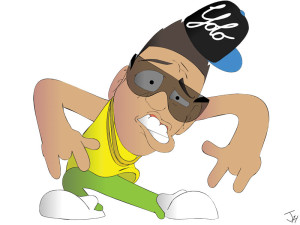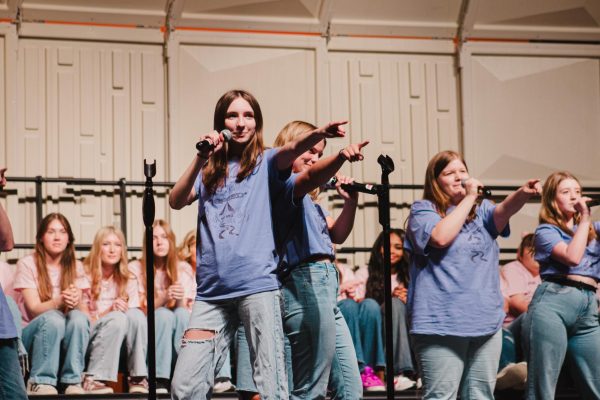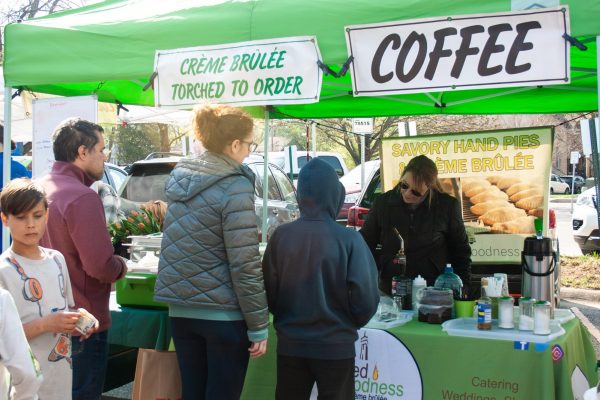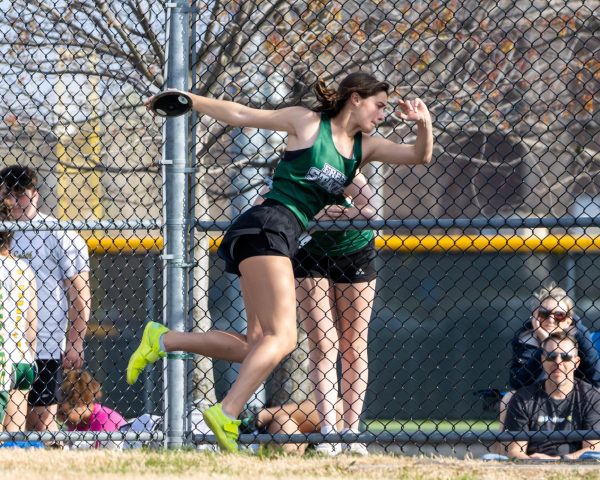Stereotypes
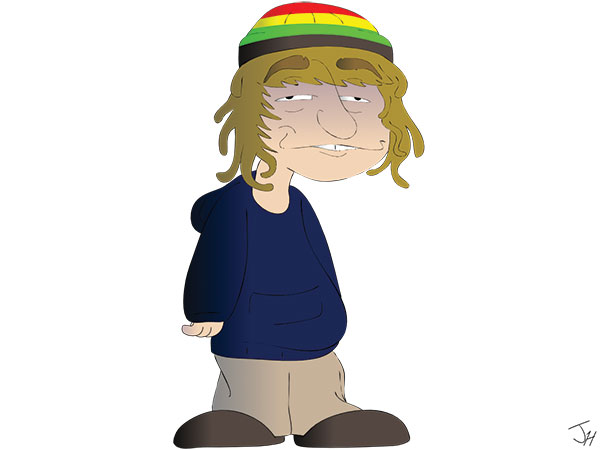
With his swooped black hair and red plaid pants, sophomore Caleb Woodard admits he is often judged. However, the pot-smoking, scene-affiliated, hooky-playing punk stereotype begins and ends with his eccentric outfit.
As with many students, there is more than meets the eye.
Woodard’s outward appearance lends itself to fitting the typical “scene/emo punk” faction of the high school hierarchy, but he insists that each person is too unique to fit into a certain preconceived mold. In fact, some of Woodard’s habits distinctly contradict his label, reinforcing his belief that no person fits a category perfectly.
“I actually do my work in school,” Woodard said. “I actually listen to pop sometimes and rap and people don’t actually see me as doing that.”
While Woodard takes pride in defying his stereotype, senior Tom Muiller embraces his given label.
“I’m the country boy of the school,” Muiller said. “I don’t mind it. I definitely wear jeans and boots and come from a country family. I live on a farm, [and] I hunt [and] fish.”
Muiller believes stereotypes don’t have to have a negative connotation.
“Stereotypes are what you like and what you do,” Muiller said. “It’s not supposed to be a bad thing, but people see it as a bad thing and target people for that.”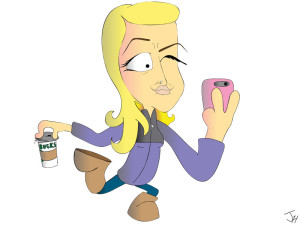
For students with the right attitude who face minimal judgement, dismissing labels comes easily. However, once categories become so restrictive as to isolate and ostracize students, stereotypes cross the line from harmless classifications to methods of discrimination.
One won’t see the classic scenario of the brawny football player stealing lunch money from the weak and unassuming mathematics champion. In fact, we are more likely to see groups like the chorus and band filled with a diverse collection of people, from the most athletic to the most academic and everything in between.
According to new student and junior Lindsay Rapp, this is not the case in all high schools. At her last school, a private institution out of state, being different was perceived as taboo.
“[At my old school], if you’re not following the same path of everyone else, you are considered an outcast,” Rapp said.
Free State operates a little differently.
“Here there are people following their own path. It is a lot more open,” Rapp said.
Despite the laudable aspects of the school, the issue of negative stereotyping is far from vanquished. When Rapp first began navigating the social scene at Free State, some warned her against associating herself with certain groups of people.
“No, don’t talk to them,” Rapp would hear. “They are really crazy.”
Even though the school is an improvement over some places, the fact that the cafeteria is still segregated to some degree–one can walk into the commons during any given lunch period and find one table filled with only disheveled, spectacle equipped, awkward kids in one corner; a table filled solely with black kids and other minorities in the next; and kids dressed in expensive clothes and wielding the newest cell phones in another side–illustrates how far we still have to come.
These kids insulate themselves in groups all on the basis of appearances in order to avoid facing something new. But if students sought out new people, they may learn something that challenges their worldview. Muiller insightfully points out the crux of the issue.
“People go for people that are just like them [because] that’s what they know, [and] that’s what they are comfortable with,” Muiller said. “They don’t branch out because… that might be weird or different.”
Tom Muiller, 12th:
Are you stereotyped?
“I’m the country boy of the school. I don’t mind it. I definitely wear jeans and boots and come from a country family. I live on a farm, [and] I hunt [and] fish.”
Do people treat you differently because of your stereotype?
“I don’t think [that people treat me differently because of my stereotype] because most people have known me my whole life and they’re just kind of used to it by now. I don’t think that they treat me differently at all. I am just a normal student here. [It is] outside of school that I do things differently.”
How would you stereotype yourself?
“We’re a pretty easygoing group of people; we’re just good ole’ boys and girls that want to have fun. If you want to be our friend, be our friend. [We are] definitely in the minority. There are not a whole of people that are like me around. I’m a very friendly person. If someone wants to come up and talk to me, that’s fine. A lot of people think I’m scary, and yeah I’m a senior and I grow a full beard. [If] you sit down and talk to me, [you will see] I’m a pretty nice guy. I’m willing to help anybody if they need help and need someone to hang out with and watch their back, I will be that person.”
Do you see others stereotyping?
“There are definitely stereotypes; it is a natural thing that people do. They classify people how they want to classify people. I think that’s fine as long as you don’t treat people differently because of it.”
Cale Kobler, 12th:
Do people stereotype you?
“Yeah, people tell me that I’m a hipster.”
Would you agree that you’re part of that category?
“I would say that I have some things in common with what hipsters are perceived as, but I wouldn’t consider myself a hipster. I would not call myself [a hipster], but I have connections with the hipster [culture]. I don’t follow the crowd, and that is something that I have in common [with hipsters].”
How do you think you defy your stereotype?
“I feel like hipsterdom is coming to the masses. Everyone shops at Urban Outfitters. Society is becoming a hipster. I just kind of ‘do me’ and people perceive that as being a hipster. I don’t listen to obscure music; I just listen to what I want. I listen to a lot of rap. Kanye West is literally the greatest artist of all time in my opinion, and I feel like not a lot of hipsters believe that.”
Indigo Bahn, 10th:
What have you been stereotyped as?
“I’ve been called a hippie, an emo kid, a scene kid, punk rock. Everyone’s like, ‘You’re obviously not normal.’ My clothes are totally wild and crazy, and people don’t really see who I am; they just see what I wear.”
What would you stereotype yourself as?
“I don’t think I fit into any group because I hang out with everyone. I even have some preppy friends who bring me up to their groups, and everyone will just stare at me like I’m crazy.”
What is one thing about you that might surprise people?
“People [think] I listen to punk or screamo, [but] I listen to rap and dubstep, which is weird because I’m really nice, and I dress crazy, and then I listen to rap; it doesn’t make any sense.”
Tye Carter, 11th:
How do others perceive you?
“Sports guy, doesn’t get good grades, doesn’t do homework. Because I play sports or how I act. Football and Baseball. I’m not very serious; I usually joke around.”
Do you get treated differently when you’re stereotyped?
“No, but if I tell them my grades they’re like ‘oh I thought you’d get like all C’s or D’s or fail,’ and obviously that’s not really good.”
what is something about you that might surprise people?
“I actually do try in school, I try to get good grades, I actually care about where I go to college.”
Elijah Houk, 11th:
How would you stereotype yourself?
“I guess I’m a normal guy, I don’t know, It really all depends on the person, I like music, I know how to program on a computer, savvy with stuff like that, but, I guess, you can’t really just tell stuff like that about a person from looking at them.”
Do you see stereotypes at Free State?
“Back in the day, I could probably see more stereotypes being more prominent, in society, but since there’s just so much information around us all the time, and we have our own choices at our leisure, that it’s so widened, that there’s not much more of a stereotypical person anymore.”
Caleb Woodard, 10th:
What do you think about stereotypes?
“I don’t believe in the word ‘stereotype.’ I don’t use it. I believe that every individual human is, in fact, different, so there’s no certain people that are exactly the same, so you can’t group them into a category. Honestly, there have been kids that have taken their lives because of stereotyping and people being bullied because of stereotyping, calling them obscene names, and I think it affects people greatly because the reason that there are “stereotypes” is people will jumble that person into a category and then they automatically assume that they have to be with those people.”
Do people stereotype you?
“Yes [I am stereotyped], everyday, I am actually grouped into a stereotype or judged because of a stereotype I’m grouped with and treated differently because of it. They won’t talk to me because they think I won’t talk about the same things that they like or they’ll walk away from me because I walk over to a scenario because of the group I hang out with or they judge me all the time.”
How do people stereotype you?
“They see me as a scene kid who smokes pot all the time and never does school work.”
what is something about you that might surprise people?
“I actually do my work in school and that I actually listen to pop sometimes and rap and people don’t actually see me as doing that.”
David Glauner, 12th:
How do people stereotype you?
“Because of how involved I am with the music department, people may assume I’m kind of stuffy or more free-flowing. I don’t mean to be either of those things and it really depends on where I am and which music class, If it’s choir I’m usually a little more uptight, and that’s just because it’s my passion, and more what I want to go into. When I’m singing in the halls people probably kind of look at me funny. And I can understand that. Being a tuba player, on top of everything else, people probably perceive us as we eat a lot, we’re pretty loud, and yeah! I can agree with that. Eating a lot is true, we do eat a lot.”
Would you consider yourself part of a certain stereotype?
“Yes and No, I would mostly consider myself part of that musical/nerd stereotype but at the same time, I’ve branched out into “sports.” I took a semester of weights and really felt at home so it was kind of cool to do that. So to some extent, yes, I include myself in the whole nerd fashion but I think if somebody met me for the first time they wouldn’t assume that, unless I just spouted off facts.”
How has being stereotyped affected how you’ve been treated?
“Being a senior, it doesn’t affect [me] much. I remember especially last year and the year before it did affect how people treated me, I would be rejected from some crowds and really well embraced, sometimes uncomfortably, by other crowds. But for the most part, it hasn’t changed much. I’ve pretty much always been in music, and really enjoyed it and I feel like I’ve really enjoyed the people.”
What do you think about stereotypes?
“Personally it’s a negative thing, stereotypes. It’s difficult to really classify people into certain cliques or groups, especially here at Free State, and I don’t mean that as a school pride thing, I mean that as we’re a very a diverse group, it’s a huge school, there’s so much going on, and there’s always someone who’s involved in something. and It’s super cool, I think. I’ve always loved seeing the step team at the assemblies just because it’s not something most people hear about all that often and hearing about the different diversity clubs, seeing all these posters up, it baffles me how involved everyone is and a lot of my friends are excelling scholars, national merit sometimes a lot of them are in some sort of sport, in some sort of music, and some of them are in everything they can get their hands on. So I think it’s unfair to stereotype some people just as one certain person because they could be doing everything and just having the time of their lives and not really need that lock down of a stereotype.”
Do you see stereotypes at Free State?
“No, surprisingly I don’t, and maybe that’s because- choir, I know, is the largest department in the school, so maybe I’m kind of already at the top and just don’t know. But I personally don’t think there’s a hierarchy because I see a lot of the jocks and the little guys in choir, in band, I see all this diversity in one group, it blows my mind, there’s no real hierarchy, I don’t think, because I don’t see the big guys picking on the little guys in the halls, I don’t see the little guys trying to fend for themselves just in class, I see a lot of talking, and I see a lot of happiness” about fights: “It seems like it’s always been within one group, individual groups, and it just seems like it’s not about a hierarchy it’s more just a conflict between two people and they resolve it, one way or another.”
Do you feel your stereotype is a ‘majority’?
“No, I do my best to make sure everyone feels equal, and it’s always been my philosophy that music is a binding agent, in any sort of situation, in marching band I think I had a good experience with that because- two years ago when I just started marching band, I was this really scrawny tiny kid, and all these guys from the trumpet section, from the clarinets, would just come over and be like ‘hey! how ya doin? how’s it going?’ and I would just feel so at home and it was just really cool to be so involved and feel so welcomed, so I don’t have any perceptions on any other stereotypes, everyone seems pretty nice here. And I know there are a lot of people who may disagree but, I kinda like it here.”
Maddie Williams, 12th:
Are you stereotyped?
“Yes. I’m on the cheer team, I wear my uniform to school, I’m blonde. My car is nice and I think a lot of people get the wrong idea because my parents bought the car for me, but I also helped pay for it, and I know my sister just got a car, and people have come up to me and they say things about it but I feel like people tend to see, and think what they want to think, without really knowing the situation or what’s going on.”
Are you treated differently because of a stereotype?
“I don’t know if I’m necessarily treated differently. I’m sure that people think things and don’t actually say things, I take AP classes as well, I think when I walk in with my cheer uniform, it’s like a ‘oh, she’s smart, I didn’t know she was smart.’”
Do you see a hierarchy of stereotypes at Free State?
“I don’t know if I would call it a hierarchy. I definitely think that there are different, very distinct groups. A lot of my friends are not in the same ‘stereotype’ that I am. I think my main stereotype is the cheerleader and I have cheerleader friends but they’re not all my best friends. Yeah [I have friends with other interests] I’m not one-dimension.”
How do you perceive others?
“I think it’s part of human nature to just automatically think something, but because of my stereotype and how I try to break out of it, I really try to steer clear of that [stereotyping others] and get to know people before I make an opinion about them.”



